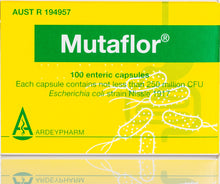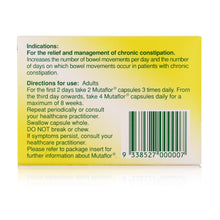This is a cold item. You must select express shipping so we may include cold pack protection for your sensitive products. Orders including cold items will only be shipped on Monday or Tuesday to preserve their temperature. Please refrigerate cold items as soon as you receive them.
Mutaflor 100 capsules
Mutaflor is registered in Australia for the relief and management of chronic constipation. Your healthcare practitioner may also utilise this strain for its pharmacological, metabolic and immunomodulation properties.
Strain-Specific Characteristics of Escherichia coli strain Nissle 1917.
- The ability to colonize
- Antagonistic activity – Inhibition of growth and or killing of pathogens
- Anti-invasive – prevention of colonisation in the gut by pathogens
- Synthesis of endogenous antimicrobial peptides-defensins
- Mucosal integrity – contributing to luminal metabolism and stability of intestinal milieu-enhanced epithelial barrier function
- Anti-inflammatory and immunomodulatory effects
- Stimulation of colonic mucosa
Servings per box: 100 capsules
Directions for use
Adults: The usual dosage of Mutaflor for Chronic Constipation in adults is: 3 to 4 capsules of Mutaflor per day.
Please note that your health care professional may suggest alternative dosing specific to your situation.
Allergen Information
Does not contain any milk proteins, gluten, wheat or lactose.
Mutaflor Ingredients:
1 gastro-resistant hard capsule of Mutaflor contains 2.5 – 25 x 10^9 viable cells (CFU) of Escherichia coli Nissle 1917. The bacteria is lyophilized and filled into hard gelatine capsules which are enteric coated in order to open up when the terminal ileum is reached.
Mutaflor should be stored refrigerated from 2 – 8 °C. A short interruption of refrigeration (3 or 4 days) does not do any harm to the product.
Product Education:
The origins of Mutaflor are somewhat less than auspicious. First isolated in 1917 from the faeces of a soldier in World War One who did not succumb to dysentery unlike most of his other comrades in regions that were highly contaminated by enteropathogens.
Mutaflor still today contains this very Nissle strain but manufactured in a modern GMP facility, lyophilized or freeze-dried, a process to remove moisture whilst the strain remains frozen and filled into gelatine capsules that are enteric coated in order that they do not open until the large intestine is reached.
Long before even the advent of antibiotics the Physicians and Microbiologists at that time all understood the role of bacteria in disease but Professor Alfred Nissle had come to recognise that some faecal E.coli isolates showed signs of antagonistic action against pathogens in vitro.
It then becomes quite apparent as to why Nissle was only interested in the soldier who was not affected by dysentery.
The Human Microbiome is made up of all the bacterial colonies on and in the human body. This collection of bacteria numbers some 10 times the number of human cells in our body.
The Gut Microbiome or Gut Microbiota accounts for up to 1000 species of bacteria and these number some 10¹⁴ microorganisms with most residing in the large intestine.
There is continuous significant interest and study of our Gut Microbiota and its relationship with our health. Rarely a week passes without a new study being published that confirms this link to overall health and a number of chronic conditions. It is well established that we humans and these microbiota communities enjoy a mutualistic and symbiotic relationship in that we depend on each other for survival.
The role of our gut bacteria is maily one of nutrition, metabolism and immunity. Established at birth and by chance as evolution intended, the gut microbiota continues to change during development. Factors in our lives, such as medication, diet and lifestyle will affect the composition of these microbes.
There are many important metabolites produced by Escherichia coli strain Nissle 1917, this and together with all its characteristics make this strain one of the most important for overall gut health.
As one of the first colonizers of the infant gut, Escherichia coli strain Nissle 1917 plays a vital role in the establishment and maintenance of a healthy gut and provides microbial barrier against pathogenic bacteria.
Its metabolic activities, consumption of oxygen, production of short chain fatty acids (SCFA) helps create an environment in which subsequent anaerobic microorganisms can establish and so begins this complex Gut Microbiome which plays a crucial role in our health.
Escherichia coli strain Nissle 1917 has shown to effect the immune system by influencing the maturation and development of the gut-associated lymphoid tissue (GALT) and can regulate the production of some immune mediators.
When there is a change in the composition of our gut microbiota there will also be a change in the metabolites produced and these in turn will place stress on the bacterial community. This change or altered bacterial composition is often referred to as Dysbiosis.
Talk to your Doctor or Healthcare Practitioner if Mutaflor may be of benefit to you.
Once supplements leave our store they cannot be returned or refunded. Please choose carefully.



